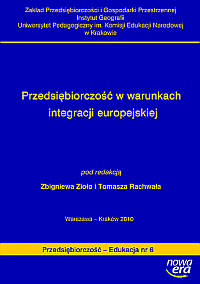Działalność japońskich koncernów motoryzacyjnych na terenie Unii Europejskiej jako wyraz atrakcyjności układów regionalnych
DOI:
https://doi.org/10.24917/20833296.6.5Słowa kluczowe:
Japonia, koncerny, motoryzacja, UE, regionyAbstrakt
Automobile industry is one of the key factors contributing to the global economy as it has an impact on both the economic situation in other sectors of economy which produce for the demands of the automotive market and also on other business areas such as services and trade. The subject of this article is to analyse the evolution of the Japanese car industry as an important element of the global economy. The activities and dynamics of Japanese automotive companies are presented as well as their impact on the current shape of the European car industry. When starting the production of cars, especially in the early stages of the automative industry development, the Japanese largely exploited modern technology acquired through the purchase of licenses in Western Europe and the USA. As a result of strenghtening global process of concentration of capital, new corporations are formed in the Japanese automotive market. These corporations are characterised by constantly increasing economic potential. In the next part of the article it has been noted that global corporations, including automobile corporations, seek new effective locations for their factories but also various regions create different conditions to attract new investments to their territory. The article then goes on to present the spatial structure of production of Japanese automotive companies in the world according to different continents in years 1985-2008 and then examines the dynamic changes in the scale of production for individual continents. The next part of the article concetrates on the spatial structure of passenger cars and components factories, as well as on research and development centers belonging to Japanese automotive companies located in the European Union. The analysis of the structure and size of employment in factories based in the European Union has also been made.
Bibliografia
Annual Report of Honda Giken Kogyo Kabushiki Kaisha/Honda Motor Co., Ltd. U.S. Securities and Exchange Commission (SEC), http://secfilings.nyse.com/filing.php?doc=1&attach=ON&ipage= 5751830&rid=12#toc87775_5 (Retrieved 2008-03-31).
„Forbes” 2008, Special Report. The World`s 2000 largest Public Companies.
Gierańczyk W., Stańczyk A., 2003, Korporacje międzynarodowe w przestrzeni globalnej [w:] Kształtowanie się struktur przemysłowych, red. Z. Zioło, Z. Makieła, „Prace Komisji Geografii Przemysłu PTG”, nr 5, Wydawnictwo Naukowe AP Kraków, Warszawa–Kraków, s. 73–83.
Kilar W., 2008, Zatrudnienie w działalności badawczej i rozwojowej jako czynnik rozwoju gospodarki opartej o wiedzę [w:] Rola przedsiębiorczości w gospodarce opartej na wiedzy, red. Z. Zioło i T.Rachwał, „Przedsiębiorczość – Edukacja”, nr 4, Zakład Przedsiębiorczości i Gospodarki Przestrzennej IG AP, wydawnictwo Nowa Era, Warszawa–Kraków, s. 60–69.
Motor Vehicle Statistics of Japan – year 2008.
Rocznik Statystyczny GUS za lata 1955–2000.
Sala S., 2003, Wybrane cechy działalności korporacji transnarodowych i ich implikacje dla Polski [w:] Przemysł w procesie globalizacji, red. Z. Zioło, Z. Makieła, „Prace Komisji Geografii Przemysłu PTG”, nr 6, Wydawnictwo Naukowe AP Kraków, Warszawa–Kraków, s. 101–107.
Word Motor Vehicle Production – Word Ranking of Manufacturers years 2000–2008, OICA.
Wójtowicz M., 2009, Wpływ globalizacji i integracji w ramach MERCOSUR na wymianę handlową produkcji przemysłu samochodowego Brazylii w latach 1990–2006 [w:] Wpływ procesów globalizacji i integracji europejskiej na transformacje struktur przemysłowych, red. Z. Zioło, T. Rachwał, „Prace Komisji Geografii Przemysłu PTG”, nr 12, Wydawnictwo Naukowe AP Kraków, Warszawa– Kraków, s. 63–76.
Zioło Z., 2008, Ekonomiczne i społeczne uwarunkowania rozwoju gospodarki opartej na wiedzy [w:] Rola przedsiębiorczości w gospodarce opartej na wiedzy, (red. Z. Zioło i T. Rachwał), „Przedsiębiorczość – Edukacja”, nr 4, Zakład Przedsiębiorczości i Gospodarki Przestrzennej Instytutu Geografii Akademii Pedagogicznej w Krakowie, wydawnictwo Nowa Era, Kraków–Warszawa, s. 12–23.
Zioło Z., 2009, Procesy kształtowania się światowych korporacji i ich wpływ na otoczenie [w:] Wpływ procesów globalizacji i integracji europejskiej na transformacje struktur przemysłowych, red.Z. Zioło, T. Rachwał, „Prace Komisji Geografii Przemysłu PTG”, nr 12, Wydawnictwo Naukowe AP Kraków, Warszawa–Kraków, s. 11–30.
http://oica.net/category/production-statistics/
http://www.acea.be/index.php/collection/statistics
http://www.aisin.com/profile/outline/index.html
http://www.bridgestone.com/corporate/profile/index.html
http://www.daiichisankyo.com/corporate/profile/index.html
http://www.fhi.co.jp/english/outline/inoutline/index.html
http://www.globaldenso.com/en/csr/employee/career.html
http://www.globalsuzuki.com/corp_info/outline/index.html
http://www.isuzu.co.jp/world/investor/fact/profile.html
http://www.mitsubishi-motors.com/corporate/about_us/profile/e/index.html
http://www.mazda.com/profile/outline/index.html
http://www.toyota-boshoku.co.jp/en/company/gaiyou.html
http://www.toyoda-gosei.com/Information/outline/index.html
http://www.toyota-industries.com/corporateinfo/corpdata/
http://www.yamaha-motor.co.jp/global/about/overview/index.html
http://www2.toyota.co.jp/en/about_toyota/overview/index.html
Pobrania
Opublikowane
Jak cytować
Numer
Dział
Licencja
Artykuły publikowane są zgodnie z warunkami licencji Creative Commons (CC BY-ND 4.0; uznanie autorstwa-bez utworów zależnych).

